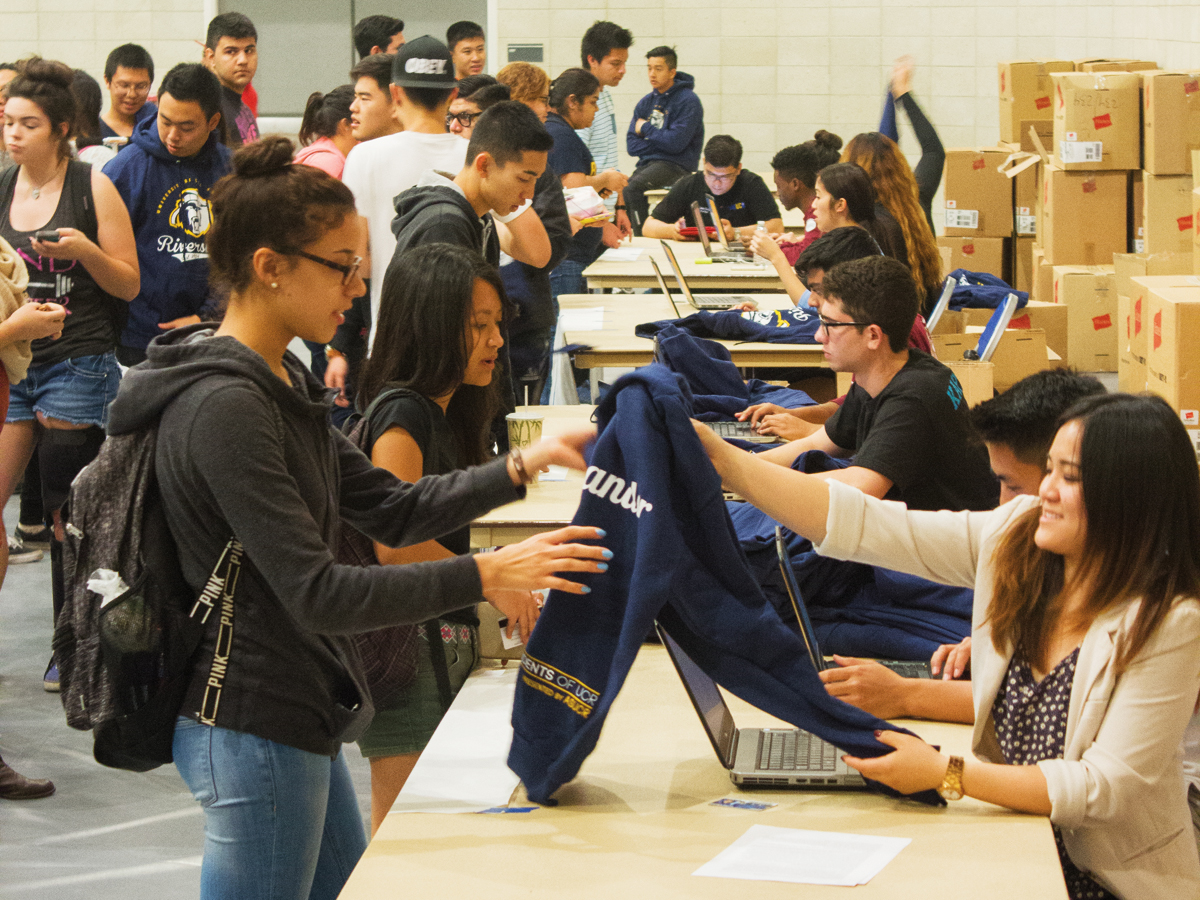
As ASUCR’s R’Gear initiative draws to a close, controversies have surfaced regarding what has been perceived as poor organization, a lack of transparency and questionable labor practices in the student government’s effort to boost campus pride by giving out free sweatshirts.
While R’Gear’s initial release for freshmen on Feb. 18 ran smoothly, the extended release last Wednesday, the first day of a three-day event in which upperclassmen were invited to pick up a sweatshirt, sparked members of ASUCR to voice their concerns at their meeting on the same day.
“I noticed chaos,” said Senator Herman Sangha about Wednesday’s event. He and other ASUCR members noted occurrences they witnessed such as line-cutting and students being misinformed about whether they were guaranteed a sweatshirt.
While ASUCR President and R’Gear organizer Nafi Karim was not present at the senate meeting because he was cleaning up after the release, he expressed his views later in an interview.
He said that he was “pleasantly surprised, yet taken back a bit” at the event’s unexpected popularity, adding that additional volunteers were sought after the first half-hour to accommodate the high turnout.
Corey Willis, a second-year anthropology major who volunteered at the event, stated that he did not witness many instances of line-cutting or much disorganization, saying that out of the thousands of students who participated, only 68 did not receive sweatshirts.
Karim also explained that students who did not fill out the online form by 11:45 a.m. that ASUCR had emailed to the student body last Tuesday could not be guaranteed a sweatshirt since demand would have exceeded supplies were this rule to be broken.
“This was our first year (implementing R’Gear), Karim said. “There was nothing that I could have based this on,” he continued, but conceded that the event could have been handled better.
Concerns were also raised when individuals such as Senator Akeem Brown and Outreach Director Jessica Urquidez noted that the sweatshirts’ tags read “Made in Honduras,” after Karim promised that he had ordered the sweatshirts locally to avoid sweatshops.
Karim explained that he rejected several overseas vendors, including one in Bangladesh that offered a price of $4.40 per sweatshirt in favor of a local Riverside vendor at a price of $7.30 per sweatshirt. Additional fees for colors and graphics increased the price per sweatshirt to $9.21. Although this vendor works with Hanes, a clothing company that contracts in Honduras, both companies guarantee safe labor practices.
Several members of ASUCR also felt left out of many parts of the process and expressed concerns over the high cost of the initiative.
“One of my main concerns is the transparency behind it,” said Brown, echoing Urquidez’s concerns. “I still have not seen the minutes from the summer,” he continued, referring to a summer executive cabinet meeting — which the senate does not attend — during which the cost of R’Gear was approved. While ASUCR eventually shared the minutes at the request of Highlander, as of press time, they have yet to be posted publicly. The minutes, however, only contain information about the initial stages of the R’Gear program.
The total cost of the project was $51,601.86, nearly $10,000 higher than the initial estimate of $43,800 that Karim gave the Highlander. He attributed this discrepancy to being unsure of the cost at the time, and later noted that R’Gear only took up about 3.2 percent of ASUCR’s overall budget.
He also pointed out that while the senate did not attend the summer meeting, they approved the minutes, which listed the cost. “That was not hidden at all,” he said, adding that he offered to meet one-on-one with senators to discuss project updates.
Sangha, however, was not satisfied. “The senate was ‘informed’ on all of actions taken by the Executive Cabinet during their (meeting),” he said, but noted that the minutes were missing information such as directors’ reports. “I question the legitimacy of the minutes,” he continued. “The senate was informed of all of these actions when we informally met week 1 … (but) I never was once asked for my input on R’gear.”
Mayra Guardado, an upperclassman who picked up her sweatshirt last Friday, did not experience difficulties with the event itself, but changed her opinion of the initiative when she found out how much it cost.
“That money could have been used for scholarships and grants for students,” she said. “If I would have known (the cost), I would have been like ‘why are you giving out free stuff like this?’”
While several members of ASUCR still support the initiative, others remain unconvinced. “I don’t think it is fair that we spent 53,000 plus dollars (sic) on this initiative that is not being implemented correctly,” said Sangha.
Contributions made by Aaron Grech








